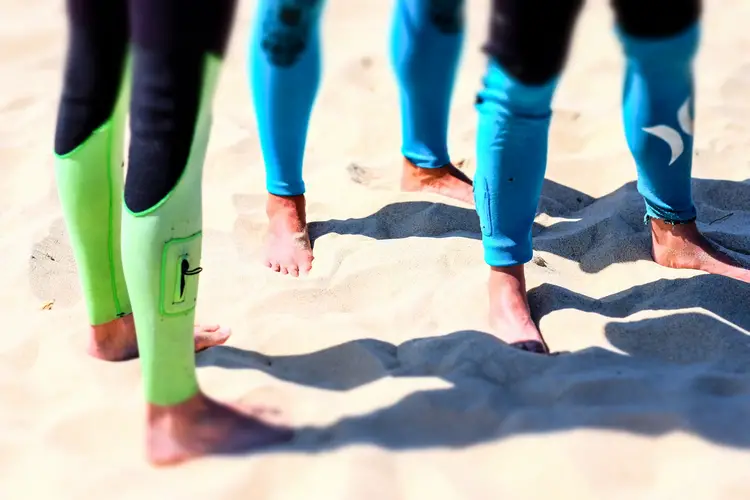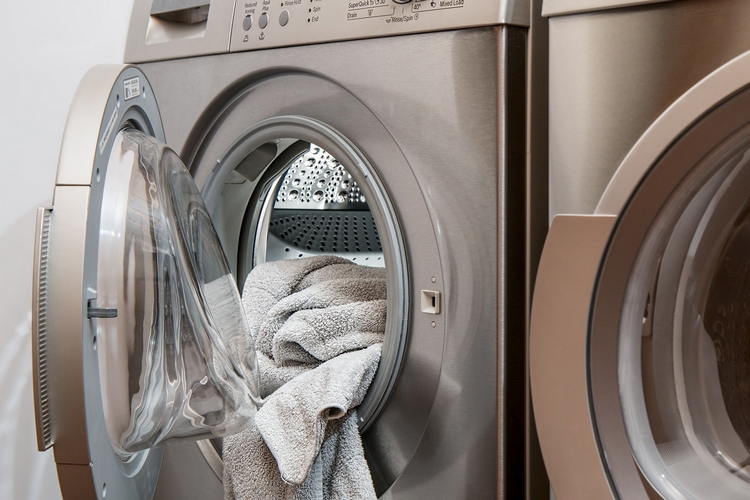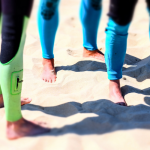
By the fact you are reading this article, it probably means you’re like most wetsuit wearers, and you pee in your wetsuit. If you’re like me, often times it’s when I first jump in and hit the water that I cool down and want to pee.
This is especially true when I’m using my wetsuit for scuba diving, as it’s important to stay hydrated when scuba diving, so you tend to pee more.
But if anyone says they don’t pee in their wetsuit, they are probably lying or they are probably embarrassed to admit it. This means that most wetsuit wearers at some stage would want to know how to get urine smell out of wetsuit.
The best way to get any smell out of wetsuit is to wash it in a container of water with a cap-full of wetsuit shampoo, Dettol, Febreze or Woolite. It’s best to vigorously rinse the wetsuit inside-out to washout any bad smells. Make sure to air dry your wetsuit inside-out so it’s ready to wear. But please read-on for more about urine smells, and a trick I use towards the end of a dive or snorkel to best avoid the problem of a urine smell in a wetsuit.
But a smelly wetsuit is not just about urine smells, and whether it smells can depend on the water you’ve been in that can make a difference to how much your wetsuit smells.
The best way to do more diving is to book yourself on a scuba diving liveaboard. You can check the latest and best deals on liveaboards using the following window:
What can I wash neoprene wetsuit with?
When washing your wetsuit you should use neoprene-friendly solutions that will not damage the material, which includes wetsuit shampoo and diluted Dettol. But let’s take a look at a list of products you can use as an alternative to wash your wetsuit to get rid of smells:
- Can you use clean water to clean your wetsuit? Clean cold water is a good way to rinse your wetsuit off after using it, to rinse off salt from sea water or smelly lake water if you’ve used it in a lake. But if your wetsuit is already smelly, you may need to add something to the water to get rid of the smell.
- Can you use baby shampoo to clean your wetsuit? You can rinse your wetsuit in a mild solution of baby shampoo, but this isn’t the best product to use to get rid of smells and bacteria.
- Can you clean a wetsuit with dish soap? Washing a wetsuit with a mild solution of dishwashing soap shouldn’t harm the neoprene. Make sure to rinse out all the soapsuds after cleaning. Dish soap is good at breaking down body oils and will help to avoid the build up of smelly bacteria, but use antibacterial dish soap to kill the bacteria.
- Can you clean a wetsuit with vinegar? You can clean your wetsuit using a few drops of white wine vinegar, as vinegar is good at killing any bacteria, which is what causes the smells. But white wine vinegar doesn’t smell very nice, so add some nice smelling essential oils to make it smell good.
- Can you clean a wetsuit with baking soda? You can clean your smelly wetsuit with a mild solution of baking soda, as it causes dirt and grease to dissolve in water. Add baking soda to vinegar and you’ve created a disinfectant to also kill any bad smelling bacteria too.
- Can you wash your wetsuit with wetsuit cleaner? There are a number of special wetsuit cleaners you can use to clean it. Some of these wetsuit cleaners are biodegradable like Rip Curl’s “Piss Off Wetsuit Shampoo”. Other products includes the Coco Loco wetsuit cleaner shampoo, which is also eco friendly.
- Can you wash your wetsuit with detergent? You can use a heavily diluted washing detergent to clean your wetsuit, as this will also help to lift any bad smells too. But if you choose to wash your wetsuit in a washing machine, be careful to use a cool water wash cycle and avoid the spin dry.
- Can you wash your wetsuit with Dettol? Dettol contains Chloroxylenol which kills bacteria and is good at getting rid of smells in a wetsuit. It doesn’t appear that Dettol will damage the neoprene, especially if used in dilution.
- Can you wash your wetsuit with Febreze? Febreze is good for cleaning wetsuits and will help get rid of any bad smells. Add a small capful to a container of water and vigorously rinse your wetsuit for a few minutes.
- Can you wash your wetsuit with Woolite? A capful of Woolite added to water is a goo way to clean a wetsuit and help get rid of any bad smells.

How to get urine smell out of wetsuit?
To get rid of the smell of urine from a wetsuit is to wash it in a container of warm water with a cap-full of, Dettol or Mirazyme. It’s best to vigorously rinse the wetsuit inside-out to washout any bad smells, and then make sure to air dry your wetsuit inside-out so it’s read to wear.
A trick I use to flush out any urine is to open the neck of my wetsuit and force water into the suit towards the end of a dive or snorkel. I do this by kicking forward with my fins to force more water inside the suit, which flushes any residual urine out. This is a good tip to also use immediately after urinating too, as it helps to flush any urine from the wetsuit. But not a good idea to do during the dive if the water is colder, as you will get cold in doing so.
The downside of this is if you’re scuba diving in colder water, as the water will be cold you’re flushing through, but if you only do this at the end of the dive, you’ll be getting out in any case. This tip works best when you’re scuba diving in warm tropical waters, so the water you flush isn’t cold.
How to get rid of the smell of sweat from a wetsuit?
The best way to get rid of sweat smells in a wetsuit is to rinse it in Mirazyme or a few drops of white wine vinegar. If you use vinegar, make sure to rinse it out to avoid your wetsuit smelling of vinegar. Alternatively use a mild solution of antibacterial dish soap to get rid of sweat-smells and to kill any bacteria.

What to avoid when cleaning a wetsuit
You shouldn’t wash your wetsuit in a washing machine, especially on a high temperature, otherwise you may damage the neoprene. Wetsuits should always be washed by hand and avoid using bleach or products that contain bleach, and don’t use a strong detergent as these can also damage the neoprene.
Talking what to avoid, you may not be able to stop yourself laughing out loud when you watch the video at the end of this post about the 5 scuba diving entry techniques of ways to avoid getting into the water from a dive boat. I must admit, I still laugh each time I watch it, but then I like “TV Bloopers“.

Can you put a wetsuit in the washing machine?
It is not recommended to wash your wetsuit in your washing machine. But if you do use your washing machine to clean your wetsuit, make sure to use a cool water wash setting of 30°C (86°F) and a low spin cycle to avoid damaging the neoprene.
Can you dry your wetsuit in a tumble dryer?
Do not put your wetsuit in a tumble dryer to dry, as this will ruin the neoprene and the material around the suit is likely to shrink. Always dry your wetsuit on a plastic hanger inside-out in a shaded and well ventilated space. Once the inside is dry, turn your wetsuit back to outside in and make sure the outside is also dry, before putting it away.
How often should you clean your wetsuit?
You should clean your wetsuit after each time you use it by rinsing it in cold water. But it as equally important to completely dry your wetsuit after rinsing it, otherwise bacteria will build up and it will smell. It’s also a lot nicer to put on a dry wetsuit next time you use it.
But it’s important to dry your wetsuit out of direct sunlight to avoid damaging the neoprene and wetsuit material. Sunlight can be very damaging, and by drying your wetsuit in a shaded area, this will prolong its life. Hang your wetsuit on a plastic hanger too so you don’t damage the material.
Final thoughts on how to clean a smelly wetsuit
It is always important you clean your wetsuit immediately after using it to avoid the build-up of bacteria. But it is also important to wash out the salt left behind after using your wetsuit in sea water. Washing your wetsuit to get rid of smells will also rinse out the salt too.
It is also important to understand how different types of water will affect the smell of a wetsuit. For example, if you use it in a lake, lake water harbours bacteria, which if left on the suit will cause it to smell terribly.
No matter where you use your wetsuit, make sure you clean it immediately after use. But it is extremely important to dry your wetsuit completely before you put it away, otherwise the next time you come to use it, it will more than likely smell really bad.
I hope you enjoyed this article about how to clean smelly wetsuits and get rid of urine smell
I’d love to hear from you. Tell us about your adventures of diving and snorkeling, in the comments below. Please also share your photos. Either from your underwater cameras or videos from your waterproof go-pro’s!
If this article hasn’t answered all of your questions. If you have more questions either about snorkeling or scuba diving (or specifically about how to clean smelly wetsuits and get rid of urine smell ), please comment below with your questions.
There will also be many more articles about scuba and scuba diving safety tips (and on snorkeling too) for you to read and learn about this fabulous sport.
Have fun and be safe!




